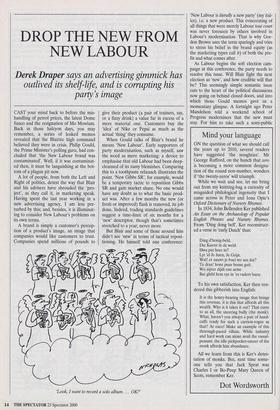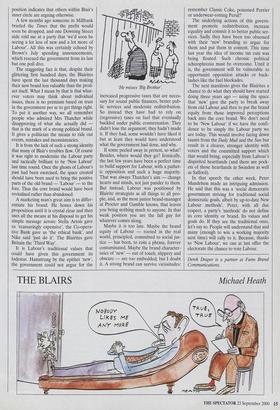DROP THE NEW FROM NEW LABOUR
Derek Draper says an advertising gimmick has
outlived its shelf-life, and is corrupting his party's image
CAST your mind back to before the mis- handling of petrol prices, the latest Dome fiasco and the resignation of Mo Mowlam. Back in those halcyon days, you may remember, a series of leaked memos revealed that the Blairite high command believed they were in crisis. Philip Gould, the Prime Minister's polling guru, had con- cluded that 'the New Labour brand was contaminated'. Well, if it was contaminat- ed then, it must be languishing at the bot- tom of a plague pit now.
A lot of people, from both the Left and Right of politics, detest the way that Blair and his advisers have shrouded the 'pro- ject', as they call it, in marketing speak. Having spent the last year working in a new advertising agency, I am less per- turbed by this; and, besides, it is illuminat- ing to consider New Labour's problems on its own terms.
A brand is simply a customer's percep- tion of a product's image, an image that companies would like customers to trust. Companies spend millions of pounds to give their product (a pair of trainers, say, or a fizzy drink) a value far in excess of a mere material one. Customers buy the `idea' of Nike or Pepsi as much as the actual 'thing' they consume.
When Gould talks of Blair's brand he means 'New Labour'. Early supporters of party modernisation, such as myself, saw the word as mere marketing: a device to emphasise that old Labour had been deep- cleansed of its nasty blemishes. Comparing this to a toothpaste relaunch illustrates the point. 'New Gibbs SR', for example, would be a temporary tactic to reposition Gibbs SR and gain market share. No one would have any doubt as to what the basic prod- uct was. After a few months the new (or fresh or improved) flash is removed, its job done. Indeed, trading standards guidelines suggest a time-limit of six months for a `new' descriptor, though that's sometimes stretched to a year; never more.
But Blair and some of those around him didn't see 'new' in terms of tactical reposi- tioning. He himself told one conference: `Look, I want to record a solo album . . . OK?' `New Labour is literally a new party' (my ital- ics), i.e. a new product. This eviscerating of all things that were merely Labour tout court was never foreseen by others involved in Labour's modernisation. That is why Gor- don Brown uses the term sparingly and tries to stress his belief in the brand equity (as the marketing types call it) of both the pre- fix and what comes after.
As Labour begins the soft election cam- paign at this conference, the party needs to resolve this issue. Will Blair fight the next election as 'new', and how credible will that be? This seemingly simple semantic issue cuts to the heart of the political discussions now going on behind closed doors, and into which those Gould memos gave us a momentary glimpse. A fortnight ago Peter Mandelson told a weekend school of Progress modernisers that the new must stay. For him to take such a semi-public position indicates that others within Blair's inner circle are arguing otherwise.
A few months ago someone in Millbank briefed the Times that the prefix would soon be dropped, and one Downing Street aide told me at a party that 'we'd soon be seeing a lot less of new and a lot more of Labour'. All this was certainly echoed by Brown's July spending announcements, which rescued the government from its last but one poll dive.
The staggering fact is that, despite their glittering first hundred days, the Blairites have spent the last thousand days making their new brand less valuable than the prod- uct itself. What I mean by that is that what- ever voters may think about individual issues, there is no premium based on trust in the government per se to get things right. To put it another way, we all remember people who admired Mrs Thatcher while disapproving of what she actually did that is the mark of a strong political brand. It gives a politician the means to ride out events, mistakes and inconsistencies.
It is from the lack of such a strong identity that many of Blair's troubles flow. Of course it was right to modernise the Labour party and tactically brilliant to be 'New Labour' last time round. Once the ghosts of Labour's past had been exorcised, the space created should have been used to bring the positive parts of the old brand — 'Labour' — to the fore. Thus the core brand would have been revitalised rather than abandoned.
A marketing man's great aim is to differ- entiate his brand. He hones down his proposition until it is crystal clear and then uses all the means at his disposal to get his simple message across: Stella Artois gave us 'reassuringly expensive', the Co-opera- tive Bank gave us 'the ethical bank', and Nike said 'just do it'. The Blairites gave Britain the 'Third Way'.
It is Labour's traditional values that could have given this government its lodestar. Hamstrung by the epithet 'new', the government could not argue for the 'He misses Big Brother', increased progressive taxes that are neces- sary for sound public finances, better pub- lic services and moderate redistribution. So instead they have had to rely on (regressive) taxes on fuel that eventually buckled under public consternation. They didn't lose the argument; they hadn't made it. If they had, some wouldn't have liked it but at least they would have understood what the government had done, and why.
If some peeled away in protest, so what? Besides, where would they go? Ironically, the last few years have been a perfect time to build support for Labour, with a pathet- ic opposition and such a huge majority. That was always Thatcher's aim — change hearts and minds, not just pander to them. But instead, Labour was positioned by Blairite strategists as all things to all peo- ple, and, as the most junior brand-manager at Procter and Gamble knows, that leaves you being nothing much to anyone. In that weak position you are the fall guy for whatever comes along.
Maybe it is too late. Maybe the brand equity of Labour — rooted in the real world, principled, committed to social jus- tice — has been, to coin a phrase, forever contaminated. Maybe the brand character- istics of 'new' — out of touch, slippery and obscure — are too embedded; but I doubt it. A strong brand can survive vicissitudes: remember Classic Coke, poisoned Perrier or underwear-rotting Persil?
The underlying actions of this govern- ment promote redistribution, increase equality and commit it to better public ser- vices. Sadly they have been too obsessed with their 'new' branding to argue for them and put them in context. This time last year the idea of income tax cuts was being floated. Such chronic political schizophrenia must be overcome. Until it is, the government will be vulnerable to opportunist opposition attacks or back- lashes like the fuel blockades.
The next manifesto gives the Blairites a chance to do what they should have started doing three years ago — using the space that 'new' gave the party to break away from old Labour and then to put the brand equity from those improved perceptions back into the core brand. We don't need to be 'New Labour' if we have the confi- dence to be simply the Labour party we are today. This would involve facing down taunts from the Daily Mail and the Sun but result in a clearer, stronger identity with voters and the committed support which that would bring, especially from Labour's dispirited heartlands (and there are pock- ets of those heartlands in Swindon as well as Salford).
In that speech the other week, Peter Mandelson made an intriguing admission. He said that this was a 'social democratic government striving for traditional social democratic goals, albeit by up-to-date New Labour methods'. Peter, with all due respect, a party's 'methods' do not define its core identity or brand. Its values and goals do. If they are the traditional ones, let's say so. People will understand that and many (enough to win a working majority next time) will rally to it. Because, thanks to 'New Labour', we can at last offer the electorate the chance to vote Labour.
Derek Draper is a partner at Farm Brand Communications.























































































 Previous page
Previous page